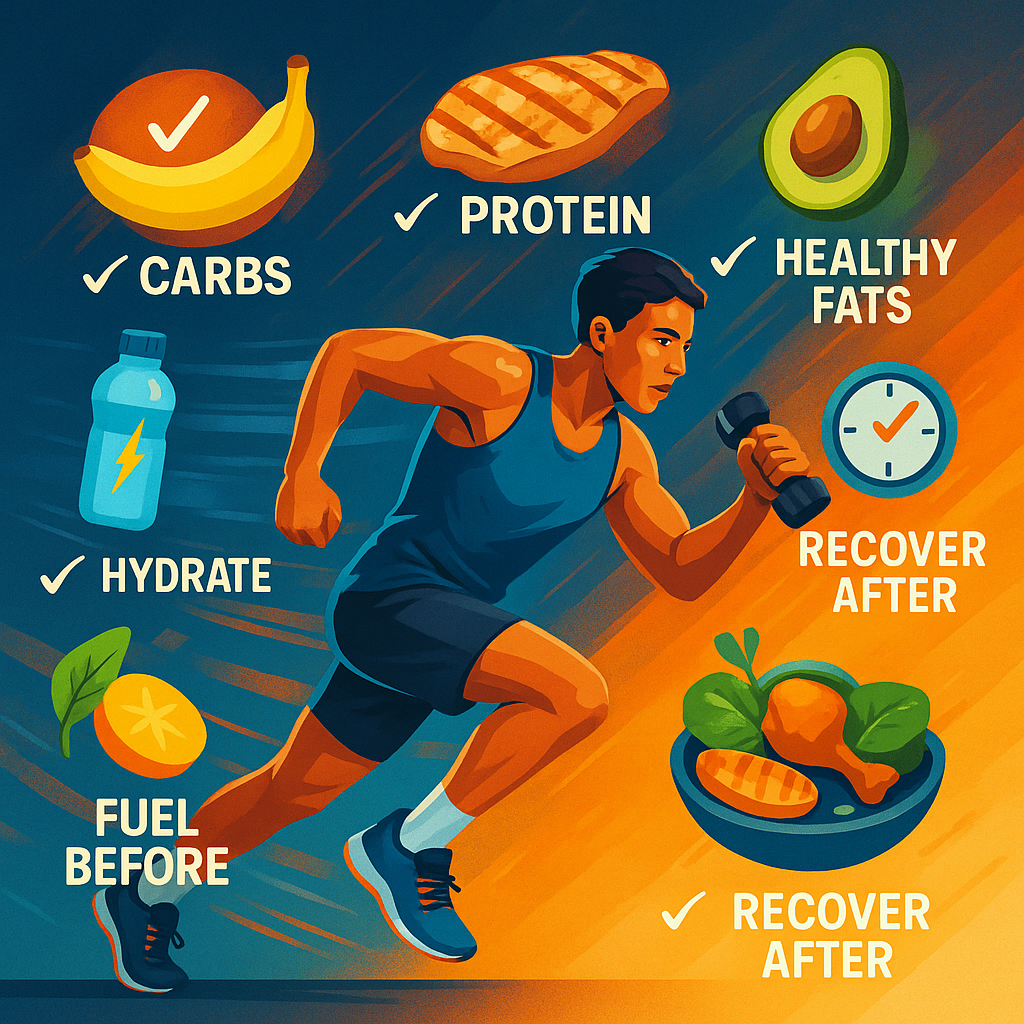Whether you're a weekend warrior, gym enthusiast, or serious athlete, your performance doesn't just depend on training it depends on how well you fuel your body. Sports nutrition is the science of using food to enhance energy, endurance, strength, and recovery. But with so much conflicting advice out there, it’s easy to get lost in myths, trends, and misinformation. This article breaks down the essentials of sports nutrition so you can train harder, recover faster, and perform at your peak without the guesswork.
1. Prioritize Protein for Muscle Repair and Growth 💪
Protein is the foundation of muscle recovery. Without it, your muscles can't rebuild after intense workouts.
- How much? Active individuals typically need 1.4–2.0g of protein per kg of body weight per day.
- Best sources: Chicken, eggs, fish, Greek yogurt, cottage cheese, whey protein, tofu, lentils.
- Tip: Spread protein intake evenly throughout the day to maximize muscle synthesis.
2. Carbs Are Your Training Fuel 🥯
Carbohydrates are your body’s primary energy source during moderate to high-intensity training.
- Why it matters: Low-carb diets can lead to fatigue, poor performance, and muscle breakdown during intense exercise.
- Sources to focus on: Whole grains, oats, sweet potatoes, rice, fruit, quinoa.
- When: Eat carbs before and after workouts to fuel performance and replenish glycogen stores.
3. Don't Fear Fats - Use Them Wisely 🥑
Healthy fats are essential for hormone production, brain function, and long-term energy (especially in endurance sports).
- Smart sources: Avocados, olive oil, nuts, seeds, fatty fish (like salmon or sardines).
- Timing: Avoid high-fat meals immediately before training they digest slowly and may cause discomfort.
4. Hydration Can Make or Break Your Workout 💧
Even mild dehydration (1–2% of body weight) can impair strength, coordination, and endurance.
- General rule: Drink at least 2–3 liters of water per day, more if training hard or sweating heavily.
- Pre-workout: Drink 400–600ml of water 1–2 hours before training.
- During: Sip water every 15–20 minutes, especially in longer or high-heat sessions.
- Post-workout: Rehydrate with water and electrolytes especially sodium, potassium, and magnesium.
5. Timing Matters - The Power of Pre & Post-Workout Nutrition ⏰
When you eat can be just as important as what you eat.
- Pre-workout: A meal 2–3 hours before training with carbs + protein. Example: chicken and rice, or oats with whey.
- Post-workout: A snack or meal within 30–60 minutes after training to boost recovery. Example: protein shake + banana or turkey wrap.
- Why it works: This supports muscle repair, hormone regulation, and glycogen restoration.
6. Supplements Can Help - But Only When Needed 🧃
Food first, always but targeted supplements can fill the gaps when diet isn’t enough.
- Evidence-based options:
- ✔️ Whey protein – fast-digesting post-workout fuel
- ✔️ Creatine monohydrate – improves strength, power, and muscle growth
- ✔️ Electrolytes – replenish minerals lost in sweat
- ✔️ Beta-alanine – may enhance endurance in high-intensity sports
7. Don’t Neglect Recovery Nutrition 💤
Training breaks you down recovery builds you up. What you eat post-training determines how fast you bounce back.
- Recovery formula: Carbs + protein + fluids. Example: smoothie with banana, whey, oats, and almond milk.
- Tip: Add anti-inflammatory foods like berries, turmeric, or dark leafy greens to support recovery.
8. Listen to Your Body 🧠
Everyone's nutrition needs are different. What works for one athlete may not work for another.
- Biofeedback matters: Energy, sleep, digestion, mood, cravings these are signs of whether your nutrition is supporting you.
- Track: Use a journal or app to track how different foods or routines affect performance and recovery.
Final Thoughts
You don’t need a complicated nutrition plan to fuel your body like an athlete. Focus on consistency, whole foods, hydration, and smart timing and you’ll notice major shifts in performance, energy, and recovery. Remember: the best sports nutrition strategy is the one you can stick with and adapt as your goals evolve.


